#indian army chief pakistan
Explore tagged Tumblr posts
Photo
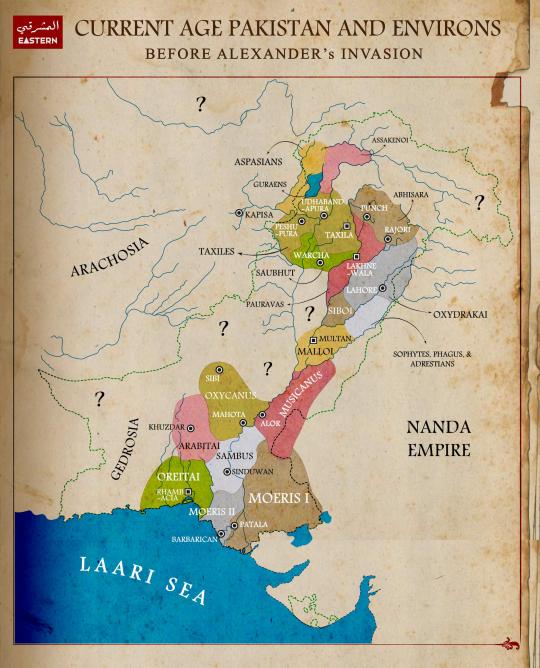
Regions of Current Age Pakistan before Invasion of Alexander
Alexander the Great's military campaigns in the Indus Valley (modern-day Pakistan) involved significant engagements with local territories, kingdoms, and their rulers. In 329 B.C., Alexander conquered Qandhar and encountered Indian tribes for the first time, marking the beginning of his interactions with the complex political landscape of the area. By 327 B.C., he had crossed the Hindukush Mountains, capturing key fortifications such as Astes Fort and massacring 7000 Indians at Massaga of Assakenians. His conquest continued with the siege and capture of Aornos in December of the same year.
During his campaigns, Alexander encountered various powerful entities in the region. The Buddhists, particularly in Sind, were influential, with prominent temples in Multan and Alore. Despite the power of the Buddhist monks, the Brahmins played a significant role in resisting Greek advances, inciting rebellion among local rulers such as Sambus. This resistance led to notable conflicts, including the defeat of Poros in 326 B.C. and the collapse of the Mallians in 325 B.C. The Greek conqueror’s interactions with these local powers highlight the complex and multi-faceted nature of the region's political dynamics.
Alexander's campaign in the southern Punjab in 326 B.C. was marked by the defeat of the Malli and Oxydraki principalities, followed by the liberation of the rivers Hydaspes, Acesines, and Indus. His naval fleet, consisting of 2000 warships, played a crucial role in these operations. The submission of Musicanus, the chief of upper Sind, who paid homage to Alexander to avoid destruction, further exemplifies the mix of military might and diplomatic engagements that characterized Alexander's approach. The appointment of Peithon as the Governor of Sind and the dispatch of Krateros with an army via Bolan Pass were strategic moves to consolidate Greek control over the region.
The period following Alexander's departure saw significant turmoil. In 325 B.C., revolts in Patala and other regions, such as the rebellion of Sambus and Musicanus, were brutally suppressed. Alexander's forces, led by his generals, employed severe measures, including mass executions and enslavement, to quell these uprisings. The death of Philippus, the Satrap of Upper Sindhu Valley, due to internal jealousy among Greeks and Macedonians, underscores the tensions within Alexander’s administration. These events reveal the fragile nature of Greek control and the persistent resistance from local rulers and populations.
Alexander's death in 323 B.C. marked a turning point, as his empire was divided among his generals. Despite the fragmentation of his empire, Sind continued to be governed by Peithon, reflecting the lasting impact of Alexander's conquests on the region. The strategic and administrative decisions made during his campaigns had enduring effects, shaping the political landscape of Sind and its neighboring territories. Alexander's legacy in these regions is a testament to the complex interplay of military conquest, local resistance, and administrative governance that defined his rule.
103 notes
·
View notes
Photo

Second Anglo-Sikh War
The Second Anglo-Sikh War (1848-9) once again saw the British East India Company defeat the Sikh Empire in northern India. The war, which started off as a rebellion against British colonial rule, included the high-casualty Battle of Chillianwala, but the conflict was finally won by the EIC with a decisive victory at the Battle of Gujrat in February 1849.
The EIC & the Sikh Empire
The British East India Company had been grabbing territory since its victories at the 1757 Battle of Plassey and the 1764 Battle of Buxar, which gave the British a vast and regular income in local taxes, besides other riches. The EIC kept on expanding and defeated the southern Kingdom of Mysore in the three Anglo-Mysore Wars (1767-1799) and the Maratha Confederacy of Hindu princes in central and northern India in the three Anglo-Maratha Wars (1775-1819). Next came expansion in the far northeast and more victories in the Anglo-Nepalese War (1814-1815) and the three Anglo-Burmese Wars (1824-1885). The next and final target of the EIC was northwest India and the Punjab, the heartland of the Sikh Empire.
The Punjab, located in the northwest of the Indian subcontinent, is an area which today covers parts of Pakistan and India. The Sikh Empire had risen due to the gradual decline of the Mughal Empire (1526-1857). Sikh territories were divided between 12 misls or armies, each led by a chief who collectively formed a loose confederation. The greatest of Sikh leaders was Ranjit Singh (1780-1839), the 'Lion of Lahore'. He forged the Sikh Empire by modernising the army and conquering Multan and Kashmir (1819), Ladakh (1833), and Peshawar (1834). This expansion rang alarm bells in the offices of the East India Company, especially after their failure in the First Anglo-Afghan War (1838-42) to the north.
In 1839, the Sikhs, Afghans, and British signed a treaty to protect existing borders. Ranjit Singh died in June 1839, and political turmoil weakened the Sikh government's control over its own army. Rajit Singh's youngest son, Duleep Singh (l. 1838-1893), was selected as the new Sikh ruler in 1843, but as he was but a child, his mother, Jind Kaur (aka Rani Jindan, d. 1863), ruled as regent. Jind Kaur supported a military escapade against the British since, even if the Sikhs lost, this would cut the army down to size, perhaps ending the interference of the generals in government affairs and certainly reducing the threat of a military coup.
The EIC exploited the turmoil and conquered the Sindh province (southwest of the Punjab) in 1843. Confident that some of the Sikh misls in the east supported closer ties with the EIC, the British prepared for war in the Punjab and amassed an army of 40,000 men to the southeast of the Sikh state. In the wider world of empires, the British no longer considered the Sikh Empire a useful buffer zone in case of expansion of the Russian Empire into Afghanistan and northern India – the so-called Great Game. The Sikhs would now have to fight the seemingly unstoppable armies of the East India Company.
Continue reading...
19 notes
·
View notes
Text
Events 3.16 (after 1970)
1977 – Assassination of Kamal Jumblatt, the main leader of the anti-government forces in the Lebanese Civil War. 1978 – Former Italian Prime Minister Aldo Moro is kidnapped; he is later murdered by his captors. 1978 – A Balkan Bulgarian Airlines Tupolev Tu-134 crashes near Gabare, Bulgaria, killing 73. 1978 – Supertanker Amoco Cadiz splits in two after running aground on the Portsall Rocks, three miles off the coast of Brittany, resulting in the largest oil spill in history at that time. 1979 – Sino-Vietnamese War: The People's Liberation Army crosses the border back into China, ending the war. 1984 – William Buckley, the CIA station chief in Lebanon, is kidnapped by Hezbollah; he later dies in captivity. 1985 – Associated Press newsman Terry Anderson is taken hostage in Beirut; he is not released until December 1991. 1988 – Iran–Contra affair: Lieutenant Colonel Oliver North and Vice Admiral John Poindexter are indicted on charges of conspiracy to defraud the United States. 1988 – Halabja chemical attack: The Kurdish town of Halabja in Iraq is attacked with a mix of poison gas and nerve agents on the orders of Saddam Hussein, killing 5,000 people and injuring about 10,000 people. 1988 – The Troubles: Ulster loyalist militant Michael Stone attacks a Provisional IRA funeral in Belfast with pistols and grenades. Three persons, one of them a member of PIRA are killed, and more than 60 others are wounded. 1995 – Mississippi formally ratifies the Thirteenth Amendment to the United States Constitution, becoming the last state to approve the abolition of slavery. The Thirteenth Amendment was officially ratified in 1865. 2001 – A series of bomb blasts in the city of Shijiazhuang, China kill 108 people and injure 38 others, the biggest mass murder in China in decades. 2003 – American activist Rachel Corrie is killed in Rafah by being run over by an Israel Defense Forces bulldozer while trying to obstruct the demolition of a home. 2005 – Israel officially hands over Jericho to Palestinian control. 2010 – The Kasubi Tombs, Uganda's only cultural World Heritage Site, are destroyed in a fire. 2012 – Former Indian cricketer Sachin Tendulkar becomes the first batter in history to score 100 centuries in international cricket. 2014 – Crimea votes in a controversial referendum to secede from Ukraine to join Russia. 2016 – A bomb detonates in a bus carrying government employees in Peshawar, Pakistan, killing 15 and injuring at least 30. 2016 – Two suicide bombers detonate their explosives at a mosque during morning prayer on the outskirts of Maiduguri, Nigeria, killing 24 and injuring 18. 2020 – The Dow Jones Industrial Average falls by 2,997.10, the single largest point drop in history and the second-largest percentage drop ever at 12.93%, an even greater crash than Black Monday (1929). This follows the U.S. Federal Reserve announcing that it will cut its target interest rate to 0–0.25%. 2021 – Atlanta spa shootings: Eight people are killed and one is injured in a trio of shootings at spas in and near Atlanta, Georgia, U.S. A suspect is arrested the same day. 2022 – A 7.4-magnitude earthquake occurs off the coast of Fukushima, Japan, killing 4 people and injuring 225.
2 notes
·
View notes
Text
[ad_1] India and Bangladesh will jointly commemorate the 53rd anniversary of Vijay Diwas of the 1971 India-Pakistan war today, with the annual exchange of war veterans and serving officers. Eight Indian war veterans and two serving officers of the Indian Armed Forces have arrived in Dhaka to commemorate Bangladesh’s Victory Day celebrations. Similarly, eight distinguished Muktijoddhas (freedom fighters) and two serving officers of the Bangladesh Armed Forces also reached India to participate in the Vijay Diwas celebrations in Kolkata today, the Indian Army said on Sunday. Vijay Diwas for the 1971 Liberation War is celebrated nationwide on December 16, to commemorate India’s victory against Pakistan in the 13-day war, which ended with Pakistan signing the instrument of surrender in Dhaka and the subsequent liberation of Bangladesh (erstwhile East Pakistan). Earlier in the day, on the eve of Vijay Diwas, President Droupadi Murmu attended an ‘At-Home’ reception at Army House, hosted by Chief of Army Staff General Upendra Dwivedi. Vice President Jagdeep Dhankhar, Defence Minister Rajnath Singh, and Chief of Defence Staff General Anil Chauhan were also present for the occasion. During the reception, the President, Defence Minister and Vice President also interacted with veterans, diplomatic fraternity, Asha school children and various other eminent personalities. According to reports, 3,900 Indian soldiers are believed to have died and 9,851 were injured during the war of 1971. The Indian Army also highlighted the VP and Raksha Mantri interacting with various veterans, diplomatic fraternity, sportspersons and many others. “The reception provided an opportunity to the Hon’ble President, Vice President and Raksha Mantri to interact with #Veterans, #Veernaris, Diplomatic fraternity, Sportspersons, eminent personalities, Asha School Children and achievers from different walks of life,” the post read. [ad_2] Source link
0 notes
Text
[ad_1] India and Bangladesh will jointly commemorate the 53rd anniversary of Vijay Diwas of the 1971 India-Pakistan war today, with the annual exchange of war veterans and serving officers. Eight Indian war veterans and two serving officers of the Indian Armed Forces have arrived in Dhaka to commemorate Bangladesh’s Victory Day celebrations. Similarly, eight distinguished Muktijoddhas (freedom fighters) and two serving officers of the Bangladesh Armed Forces also reached India to participate in the Vijay Diwas celebrations in Kolkata today, the Indian Army said on Sunday. Vijay Diwas for the 1971 Liberation War is celebrated nationwide on December 16, to commemorate India’s victory against Pakistan in the 13-day war, which ended with Pakistan signing the instrument of surrender in Dhaka and the subsequent liberation of Bangladesh (erstwhile East Pakistan). Earlier in the day, on the eve of Vijay Diwas, President Droupadi Murmu attended an ‘At-Home’ reception at Army House, hosted by Chief of Army Staff General Upendra Dwivedi. Vice President Jagdeep Dhankhar, Defence Minister Rajnath Singh, and Chief of Defence Staff General Anil Chauhan were also present for the occasion. During the reception, the President, Defence Minister and Vice President also interacted with veterans, diplomatic fraternity, Asha school children and various other eminent personalities. According to reports, 3,900 Indian soldiers are believed to have died and 9,851 were injured during the war of 1971. The Indian Army also highlighted the VP and Raksha Mantri interacting with various veterans, diplomatic fraternity, sportspersons and many others. “The reception provided an opportunity to the Hon’ble President, Vice President and Raksha Mantri to interact with #Veterans, #Veernaris, Diplomatic fraternity, Sportspersons, eminent personalities, Asha School Children and achievers from different walks of life,” the post read. [ad_2] Source link
0 notes
Text
I AM not Indian....
& I AM super & supreme hater of indian army....
I AM pray to FORMLESS The Great SEFAW that whole indian army will go to hell of hells & torture mercilessly & ruthlessly till eternity and forever-ever..... indian army think they are bad-ass , let demons & snakes of hell of hells tear part their ass....
I AM support pakistan & china....
I AM pray to FORMLESS The Great SEFAW that may I AM be supreme prime alpha chief of staff commander of Ghazwa-e-hind army , which is Islamic army.....
0 notes
Text
First female fighter pilot in LCA Tejas

Squadron Leader Mohana Singh has made history as the first female fighter pilot to join the prestigious ‘Flying Bullets’ squadron, which operates India’s indigenous LCA Tejas fighter jets.
As one of the country’s pioneering female fighter pilots, Squadron Leader Singh has once again broken new ground. Her achievement highlights the Indian Air Force’s dedication to gender equality and empowerment.
The officer participated in the recent ‘Tarang Shakti’ exercise in Jodhpur, where she took part in a historic flight alongside three Vice Chiefs of the armed forces.
Squadron Leader Mohana Singh was among the first three women to become fighter pilots in the Indian Air Force.
Her fellow trailblazing female pilots, Squadron Leader Bhawna Kanth and Squadron Leader Avni Chaturvedi are currently flying Su-30 MKI fighter jets in the western desert.
Previously, Singh flew MiG-21s and has recently been assigned to the LCA Tejas squadron based at Naliya airbase in the Gujarat sector, along the Pakistan border.
During the historic flight, Squadron Leader Mohana Singh was seen guiding the Army and Navy Vice Chiefs in the LCA Tejas fighter jet, helping them prepare for the mission.Read More-https://24x7newsroom.com/
0 notes
Text
"No Provision For…": What UK Said On Sheikh Hasina Asylum Reports
British immigration rules do not allow individuals to travel to that country to seek asylum or temporary refuge, the UK Home Office told NDTV Tuesday morning, amid persistent speculation ousted Bangladesh leader Sheikh Hasina, now in Delhi, will fly to London to claim sanctuary.

The UK government - now headed by Sir Keir Starmer following Labour's landslide win last month - also said individuals seeking asylum must do so "in the first safe country they reach".
"The UK has a proud record of providing protection for people who need it. However, there is no provision for someone to be allowed to travel to the UK to seek asylum or temporary refuge."
Those who need international protection should claim asylum in the first safe country they reach - that is the fastest route to safety," a UK Home Office spokesperson told NDTV.
Nevertheless, sources indicate a formal asylum request is being processed.
Mrs Hasina, 76, was forced to resign as Prime Minister Monday evening after weeks-long protests over a jobs quota killed over 300 people. She fled Dhaka in a military aircraft - reportedly after the Bangladesh Army gave her a 45-minute ultimatum - and flew first to an IAF base in Uttar Pradesh.
Sources last night told NDTV Mrs Hasina - met on arrival in India by National Security Advisor Ajit Doval - would proceed on to London after her plane was refuelled. Since then, though, there has been confirmation of the former Prime Minister's schedule or, indeed, about her location.
Sources have, though, said she is in "protective custody" of Indian intelligence services.
She is accompanied by her younger sister, Sheikh Rehana, who is a UK citizen, which could be useful to claim asylum in that country. Also, her niece, Tulip Siddiq, is a British Labour parliamentarian.
Mrs Hasina's daughter, Saima Wazed, is based in Delhi as the regional chief for the World Health Organization. This, though, may not open doors as she works for an international agency.
This morning Bangladeshi publication Daily Sun cited unconfirmed sources as saying India has granted permission for an "interim stay", during which Mrs Hasina will get comprehensive logistical support.
This is reportedly only temporary and pending relocation to Britain.
Prime Minister Narendra Modi has been briefed on the Bangladesh situation, and External Affairs Minister S Jaishankar has spoken to leaders of all major political parties in the country.
At that meeting Mr Jaishankar spoke of a "conspiracy" to topple Mrs Hasina's government. This was in response to a question by Congress MP Rahul Gandhi, who asked if there could be an involvement of foreign powers, specifically Pakistan, in the dramatic developments in Dhaka over the past few weeks.
In speculation that has emerged (inevitably so) since Mrs Hasina quit, three key names are at the forefront, two of whom are the Army, which took charge after Mrs Hasina quit, and which may have given her a 45-minute ultimatum; and her nemesis and former Prime Minister Khaleda Zia, who was jailed in 2018 on corruption charges and whose release was ordered by the President.
0 notes
Text
How many commands are there In Indian army?
How many commands are there In Indian army? Understanding the Commands of the Indian Army
The Indian Army is one of the world's largest and most well-structured military forces, tasked with maintaining national security and defending the country's borders. With a rich history and a complex organizational structure, the Indian Army is divided into several commands, each with its own specific responsibilities and operational areas. This blog will delve into the various commands of the Indian Army, providing an informative overview while seamlessly integrating products from Military Marvels, a premier store for military-themed merchandise.
Overview of Indian Army Commands
The Indian Army is divided into seven commands, each led by a General Officer Commanding-in-Chief (GOC-in-C), who holds the rank of Lieutenant General. These commands are:
Northern Command (Udhampur)
Western Command (Chandimandir)
South Western Command (Jaipur)
Eastern Command (Kolkata)
Central Command (Lucknow)
Southern Command (Pune)
Army Training Command (Shimla)
Each command oversees multiple corps, divisions, brigades, and units, ensuring comprehensive coverage of the Indian subcontinent's diverse geographical and strategic requirements. ( Buy Military Themed merchandise online )
Northern Command
Headquarters: Udhampur, Jammu and Kashmir
The Northern Command is arguably the most strategically critical command due to its proximity to the volatile borders with Pakistan and China. It oversees operations in Jammu and Kashmir and is responsible for counter-insurgency and counter-terrorism operations in the region. The command includes the XIV Corps (Leh), XV Corps (Srinagar), and XVI Corps (Nagrota), among others.
Key Responsibilities:
Guarding the Line of Control (LoC) with Pakistan
Defending the Siachen Glacier, the highest battlefield in the world
Managing the counter-insurgency operations in Jammu and Kashmir
Responding to any incursions or conflicts with China in the Ladakh region
Western Command
Headquarters: Chandimandir, Haryana
The Western Command is responsible for the defense of India's western border with Pakistan, stretching from Jammu and Kashmir to Rajasthan. This command has a significant role due to the historical conflicts and ongoing tensions with Pakistan.
Key Responsibilities:
Securing the international border and the LoC in the Punjab and Jammu regions
Ensuring readiness for any conflict with Pakistan
Conducting training and logistical support for the forces stationed in the region
South Western Command
Headquarters: Jaipur, Rajasthan
Established in 2005, the South Western Command was created to enhance the operational efficiency of the Indian Army in the western desert regions and provide better strategic management of resources.
Key Responsibilities:
Defending the desert areas of Rajasthan and parts of Gujarat
Ensuring rapid mobilization and deployment of troops in case of an emergency
Conducting training exercises in desert warfare
Eastern Command
Headquarters: Kolkata, West Bengal
The Eastern Command is tasked with guarding India's eastern frontiers with China, Bhutan, and Myanmar. This command also oversees operations in the sensitive and insurgency-prone northeastern states.
Key Responsibilities:
Defending the Line of Actual Control (LAC) with China in the Arunachal Pradesh and Sikkim regions
Counter-insurgency operations in the northeastern states
Securing the borders with Myanmar and managing the strategic Siliguri Corridor, also known as the "Chicken's Neck"
Central Command
Headquarters: Lucknow, Uttar Pradesh
The Central Command primarily acts as a strategic reserve for the Indian Army. It is tasked with providing reinforcements and support to other commands as needed. The command also focuses on disaster management and relief operations.
Key Responsibilities:
Acting as a strategic reserve and providing reinforcements
Disaster management and humanitarian assistance
Ensuring internal security in its area of responsibility ( Buy air force jackets, T-shirts and shorts )
Southern Command
Headquarters: Pune, Maharashtra
The Southern Command is responsible for the southern part of India, covering a vast area including Maharashtra, Andhra Pradesh, Karnataka, Tamil Nadu, and Kerala. This command has a significant role in coastal defense and logistics.
Key Responsibilities:
Coastal defense and security of peninsular India
Ensuring logistical support and supply chains
Conducting amphibious operations and joint exercises with the Indian Navy
Army Training Command (ARTRAC)
Headquarters: Shimla, Himachal Pradesh
The Army Training Command is unique as it focuses on the training, doctrine, and development of the Indian Army. This command ensures that the troops are well-trained and equipped with the latest tactics and technologies.
Key Responsibilities:
Developing training doctrines and methodologies
Overseeing training institutions and programs
Ensuring the professional development of officers and soldiers
Importance of Command Structure
The command structure of the Indian Army is designed to ensure operational readiness and strategic flexibility. Each command plays a vital role in safeguarding the nation's territorial integrity and responding to both conventional and unconventional threats. The geographical distribution of commands allows for a focused approach to regional security concerns, enhancing the overall effectiveness of the Indian Army.
Coordination and Joint Operations
The Indian Army's command structure also facilitates coordination with other branches of the armed forces, including the Indian Navy and Indian Air Force. Joint operations and exercises are regularly conducted to ensure interoperability and synergy among the different services. This coordination is crucial for the effective defense of the nation, especially in scenarios requiring rapid mobilization and multi-dimensional warfare.
The Role of Each Command
Each command plays a crucial role in maintaining India's security and operational readiness. The Northern and Western Commands are on constant alert due to the sensitive nature of the borders they oversee. The Eastern Command handles not only border security but also internal security issues in the northeastern states. The Southern and South Western Commands ensure coastal and desert region security, respectively. The Central Command acts as a strategic reserve, and ARTRAC ensures the continuous professional development of army personnel.
What are Military Marvels?
Military Marvels is an online store that offers a variety of military-themed merchandise. Their product range includes clothing such as T-shirts, jackets, joggers, and shorts, as well as accessories like hats, caps, watches, and bracelets. Additionally, they provide collectibles such as military patches, keychains, and coins. The store caters to enthusiasts of the Indian Army, Navy, and Air Force, offering high-quality products that celebrate and honor the legacy of the armed forces.
Highlighting Military Marvels Products
At Military Marvels, we offer a wide range of products inspired by the Indian Army and its various commands. Here are a few more highlights:
Army - Themed Apparel: Our collection of army T-shirts and indian air force jackets feature designs inspired by different commands and regiments. These are perfect for showcasing your support for the Indian Army in style.
Accessories: From bracelets to hairbands to pins, our accessories add a touch of military flair to your everyday attire.
Collectibles: Our range of military keychains, and earrings are perfect for collectors and enthusiasts who want to own a piece of military history.
Additional Product Highlights
Air Force Collection:
Military marvels Patches: Inspired by the Indian Air Force and military, these Patches are a stylish addition to your jacket and a nod to the elite pilots who safeguard our skies. Shop Now.
Navy Collection:
TrackPants and shorts: Perfect for outdoor activities, these pants are themed after the gear worn by our naval forces. They are durable, comfortable, and versatile. Shop Now.
Home Decor:
Bar mat and Glasses: Featuring various Indian Army commands and regiments, these art pieces are a great way to bring a sense of patriotism into your home. Shop Now.
Luggage Tags:
Luggage Tags: Create a unique piece of jewelry with your own text, inspired by the dog tags worn by soldiers. Shop Now.
Tactical Gear:
Military Backpacks: army backpack Built for durability and capacity, these backpacks are ideal for both everyday use and outdoor adventures. Shop Now.
The Importance of Military-Themed Merchandise
Military-themed merchandise serves as a means of expressing support and admiration for the armed forces. It allows civilians to connect with the military, understand their sacrifices, and contribute to a sense of national pride. At Military Marvels, we strive to provide high-quality products that honor the legacy of the Indian Army and its commands.
Conclusion
The Indian Army's command structure is a testament to its strategic and operational capabilities, ensuring the nation's security and readiness at all times. By understanding the roles and responsibilities of each command, we can appreciate the dedication and hard work of our soldiers. Simultaneously, Military Marvels offers an array of products that allow individuals to show their support and pride for the Indian Army. Whether you're looking for apparel, accessories, or collectibles, our store has something for everyone who respects and admires the bravery of our armed forces.
For more details on our products, visit Military Marvels and find the perfect item to showcase your support for the Indian Army.
FAQs
1. What are the different commands in the Indian Army?
The Indian Army is divided into seven commands: Northern, Western, Southern, Eastern, Central, South Western, and the Army Training Command (ARTRAC). Each command has specific responsibilities and operational areas.
2. What roles do the Indian Army commands play?
Northern Command: Oversees the northern borders, including the Line of Control and the Siachen Glacier.
Western Command: Manages the western border with Pakistan.
Southern Command: Covers the southern part of India and coordinates with the Navy.
Eastern Command: Secures India's eastern borders and handles counterinsurgency in the northeast.
Central Command: Acts as a strategic reserve.
South Western Command: Manages the southwestern border with Pakistan.
ARTRAC: Responsible for training and education of army personnel.
3. How can I show support for the Indian Army through Military Marvels?
Military Marvels offers a range of products inspired by different Indian Army commands, including apparel, accessories, and collectibles. Each product is designed to honor and celebrate the legacy of the Indian Army.
4. What types of products does Military Marvels offer?
Apparel: T-shirts, jackets,Shorts, tracks, Raincoat.
Accessories: bracelets, pins etc
Collectibles: Patches, keychains, Backpack
Specialty Items: Hairbands, Bar Products, Car mini, Tags etc.
5. Where can I purchase Military Marvels products?
You can browse and purchase products from the Military Marvels website: Military Marvels.
6. Are Military Marvels products suitable for outdoor activities?
Yes, many of the products, such as combat pants and tactical gear, are designed for durability and functionality, making them suitable for outdoor activities and adventures.
8. Do Military Marvels products make good gifts?
Absolutely! With a variety of items ranging from stylish apparel to unique collectibles, Military Marvels products are perfect for gifting to military enthusiasts and patriots.
9. Is there a return policy for Military Marvels products?
For details on returns and exchanges, please visit the Returns Policy page on the Military Marvels website.
10. How does Military Marvels ensure the quality of their products?
Military Marvels is committed to providing high-quality merchandise. Each product is carefully crafted and undergoes strict quality checks to ensure customer satisfaction.
1 note
·
View note
Text
Indian Army's new Chief of Staff takes charge
Indian Army's new Chief of Staff takes charge #India #defence #defense #defencenews #IndianArmy #ArmyChief #GeneralUpendraDwivedi
General Upendra Dwivedi takes charge: The new Chief of the Army Staff, Gen Upendra Dwivedi, has operational experience along the frontiers with China and Pakistan. He has also served as Vice Chief of the Army and General Officer Commanding-in-Chief of Northern Command. General Dwivedi, who has vast operational experience along the frontiers with China and Pakistan, was serving as the Vice Chief…

View On WordPress
#Defence Budget#Defence Ministry#Defence News#Genera Upendra Dwivedi#India#Indian Army Chief#New Chief of Army Staff
0 notes
Text
Pakistan’s Corrupt To Their Cores Army Generals Look Increasingly Desperate! A Heavily Fraudulent Election May Not Keep Imran Khan’s Fans At Bay
— March 14th 2024 | The Economist
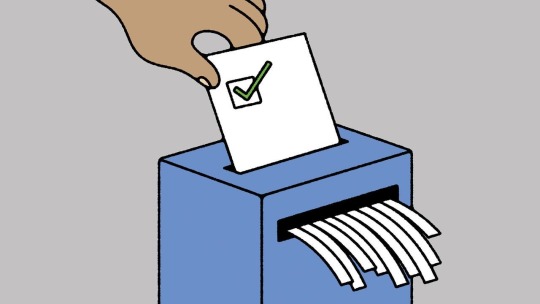
Illustration of a Ballot Being Shredded. Image Credit: lan Truong
Thief, Looter, Traitor, International Money Launderer Nawaz Sharif’s Pakistan Muslim League Party (PML-N) is Back in Power with the Help of Heavily Rigged Elections by the Pakistan’s Corrupt To Their Cores Army Generals, ISI, Politicians and Judges. Following elections last month, the thrice former prime minister’s younger brother, Shehbaz, has been installed in the ruling post. His Daughter, Lowlife, Looter, Thief, Corrupt and Stupid to her Core Maryam Safdar, is the New Chief Minister of Populous Punjab in result of Stolen Mandate of Imran Khan’s Party PTI. So why is Mr Sharif so glum? The 74-year-old “Lion of Punjab 😂😂😂” has said little publicly since the vote. Bunkered down in his mansion outside Lahore, he is said to be depressed.
He has reason to be. The PML-N’s success is much less than Mr Sharif was promised when he returned home last year. He had spent four years in exile in London because Pakistan’s Generals—Stage Managers of its Democracy—were against him. They rigged an election in 2018 in favour of his main rival, Imran Khan. But then they fell out with Mr Khan and reverted to the lion. A former cricketing god, Mr Khan is Now in Jail on Graft Charges. His Pakistan Tehreek-e-Insaf (PTI) party has been dismantled. PML-N was therefore expected to sweep the election and Mr Sharif to become prime minister for a fourth time. Instead, something unprecedented happened.
Despite the Army’s Myriad Ploys to prevent Pakistanis voting for Mr Khan, it seems most did so. Standing as independents, candidates linked to his party swept the country. Early counting put them on track for Two-Thirds of Punjab’s seats and an overall majority. At which point the Army Intervened to a degree that might make a Tin-Pot Tyrant Blush.
Army agents were allegedly sent into counting stations with alternative tallies. Salman Akram Raja, a Supreme Court Lawyer running as a De Facto PTI Candidate in Lahore, had been informed that he had won by 95,000 votes. And then—whoops—that he had lost to the PML-N Candidate by 13,500. Mr Sharif’s Party would otherwise have faced oblivion. As it is, it won only 75 of 264 seats. It cobbled together a majority by striking a deal with the Pakistan Peoples Party, which is run by another Fading Dynasty, the Bhuttos.
This might seem like Pakistani business as usual. The country has been ruled by the army, directly or at varying degrees of remove, throughout its history. In a cycle that Mr Sharif has been through several times, the Corrupt Generals put a Biddable Civilian in Power then, after he or she dares to act independently, switch to a different proxy or Army Rule. Thereby Pakistan has had Four Army Dictators and None of its 20 Civilian Prime Ministers has completed a Five-Year term. This helps explain why it is so badly governed. Having little prospect of a full term, Pakistan’s civilian regimes abjure long-term decision-making in favour of populist giveaways and graft. As recently as 2006, Pakistanis were better-off than Indians; now the average income in India is 60% higher than that in Pakistan.
A big question arising from this latest turn of the wheel is whether the army can maintain control. There are two reasons to think it could struggle. The first is Mr Khan. Perhaps unwittingly, given his erstwhile compliance with the army, he has channelled Pakistanis’ long-standing despond into anger at the military establishment. This has put Pakistani Politics on New Terrain. Had the Boak Bollocks Corrupt Army Chief, General Asim Munir, responded to the vote count by calling a state of emergency, as his predecessors might have, he would have risked an uprising. “There is This Sense That the Gravy Train Needs to Stop,” says Mr Raja, an Old Acquaintance of Banyan. “We Can’t Be Forever Governed by Two Families in Cahoots with the Powers That Be.”
The second factor endangering the status quo is a protracted economic crisis. The inflationary shocks experienced in many countries have in Pakistan combined with the effects of long-standing malgovernance to deliver chronic inflation, joblessness and balance-of-payment problems. Mr Khan’s ousting in 2022 now appears well timed for him. Mr Sharif’s decision to let Shehbaz (Both Brothers Certified Corrupt to Their Cores) lead an 16-month-long replacement government instead of calling early elections looks like a major blunder. It has hung the crisis around his party’s neck. With Pakistan’s 24th IMF Bail-Out set to expire this month, and a bigger loan urgently required, the new government will need to take measures that will make it even more unpopular than it is. Its prospects—and Mr Sharif’s hopes of rebuilding his party—appear dire.
The same could be true for the army-run establishment that Mr Sharif has unhappily rejoined. It may have got away with its latest election heist. But in the process Mr Khan’s supporters have made the Corrupt Army, ISI, Politicians and Judges Look Desperate and Vulnerable. ■
#The Economist#Heavily Rigged Elections#Imran Khan’s Stolen Elections | PTI#Pakistan’s Corrupt To Their Cores Army Generals | ISI | Politicians | Judges#IMF Bail-Out#Pakistan 🇵🇰 | Four Army Dictators | 20 Civilian Prime Ministers
1 note
·
View note
Text

Known for his indomitable spirit, leadership, and patriotism, Field Marshal Sam Manekshaw was the eighth chief of Army Staff of the Indian Army who played a pivotal role in India’s victory in the 1971 war with Pakistan. His words of wisdom serve as guiding principles for individuals seeking success. On this World Civil Defense Day, let’s take a look at an inspirational quote by the iconic personality Field Marshal Sam Manekshaw.
thoughtoftheday #motivationquotes #motivational #inspirationalquotes #dailyquotes #goodvibes #goodthought #thoughtsmatter #dailyquotes4u #ddumc
0 notes
Text
Events 7.11 (after 1920)
1920 – In the East Prussian plebiscite the local populace decides to remain with Weimar Germany. 1921 – A truce in the Irish War of Independence comes into effect. 1921 – The Red Army captures Mongolia from the White Army and establishes the Mongolian People's Republic. 1921 – Former president of the United States William Howard Taft is sworn in as 10th chief justice of the U.S. Supreme Court, becoming the only person ever to hold both offices. 1922 – The Hollywood Bowl opens. 1924 – Eric Liddell won the gold medal in 400m at the 1924 Paris Olympics, after refusing to run in the heats for 100m, his favoured distance, on a Sunday. 1934 – Engelbert Zaschka of Germany flies his large human-powered aircraft, the Zaschka Human-Power Aircraft, about 20 meters at Berlin Tempelhof Airport without assisted take-off. 1936 – The Triborough Bridge in New York City is opened to traffic. 1940 – World War II: Vichy France regime is formally established. Philippe Pétain becomes Chief of the French State. 1941 – The Northern Rhodesian Labour Party holds its first congress in Nkana. 1943 – Massacres of Poles in Volhynia and Eastern Galicia by the Ukrainian Insurgent Army within the Reichskommissariat Ukraine (Volhynia) peak. 1943 – World War II: Allied invasion of Sicily: German and Italian troops launch a counter-attack on Allied forces in Sicily. 1947 – The Exodus 1947 heads to Palestine from France. 1950 – Pakistan joins the International Monetary Fund and the International Bank. 1957 – Prince Karim Husseini Aga Khan IV inherits the office of Imamat as the 49th Imam of Shia Imami Ismai'li worldwide, after the death of Sir Sultan Mahommed Shah Aga Khan III. 1960 – France legislates for the independence of Dahomey (later Benin), Upper Volta (later Burkina Faso) and Niger. 1960 – Congo Crisis: The State of Katanga breaks away from the Democratic Republic of the Congo. 1960 – To Kill a Mockingbird by Harper Lee is first published, in the United States. 1962 – First transatlantic satellite television transmission. 1962 – Project Apollo: At a press conference, NASA announces lunar orbit rendezvous as the means to land astronauts on the Moon, and return them to Earth. 1971 – Copper mines in Chile are nationalized. 1972 – The first game of the World Chess Championship 1972 between challenger Bobby Fischer and defending champion Boris Spassky starts. 1973 – Varig Flight 820 crashes near Paris on approach to Orly Airport, killing 123 of the 134 on board. In response, the FAA bans smoking in airplane lavatories. 1977 – Martin Luther King Jr., assassinated in 1968, is awarded the Presidential Medal of Freedom. 1978 – Los Alfaques disaster: A truck carrying liquid gas crashes and explodes at a coastal campsite in Tarragona, Spain killing 216 tourists. 1979 – America's first space station, Skylab, is destroyed as it re-enters the Earth's atmosphere over the Indian Ocean. 1982 – The Italy National Football Team defeats West Germany at Santiago Bernabéu Stadium to capture the 1982 FIFA World Cup. 1983 – A TAME airline Boeing 737–200 crashes near Cuenca, Ecuador, killing all 119 passengers and crew on board. 1990 – Oka Crisis: First Nations land dispute in Quebec begins. 1991 – Nigeria Airways Flight 2120 crashes in Jeddah, Saudi Arabia, killing all 261 passengers and crew on board. 1995 – Yugoslav Wars: Srebrenica massacre begins; lasts until 22 July. 2006 – Mumbai train bombings: 209 people are killed in a series of bomb attacks in Mumbai, India. 2010 – The Islamist militia group Al-Shabaab carries out multiple suicide bombings in Kampala, Uganda, killing 74 people and injuring 85 others. 2010 – Spain defeats the Netherlands to win the 2010 FIFA World Cup in Johannesburg. 2011 – Ninety-eight containers of explosives self-detonate killing 13 people in Zygi, Cyprus. 2015 – Joaquín "El Chapo" Guzmán escapes from the maximum security Altiplano prison in Mexico, his second escape. 2021 – Richard Branson becomes the first civilian to be launched into space via his Virgin Galactic spacecraft.
0 notes
Text
On this day in Wikipedia: Monday, 5th February
Welcome, velkommen, 欢迎 (huānyíng), tervetuloa 🤗 What does @Wikipedia say about 5th February through the years 🏛️📜🗓️?

5th February 2023 🗓️ : Death - Pervez Musharraf Pervez Musharraf, Pakistani military officer and politician, 10th President of Pakistan (b. 1943) "Pervez Musharraf (11 August 1943 – 5 February 2023) was a Pakistani military officer and politician who served as the tenth president of Pakistan from 2001 to 2008. He also served as the 10th Chairman of the Joint Chiefs from 1998 to 2001 and the 7th Chief of Army Staff from 1998 to 2007. Born in..."

Image licensed under CC BY-SA 2.0? by World Economic Forum
5th February 2019 🗓️ : Event - Pope Francis Pope Francis became the first pope to celebrate a papal Mass in the Arabian Peninsula. "Pope Francis (Latin: Franciscus; Italian: Francesco; Spanish: Francisco; born Jorge Mario Bergoglio; 17 December 1936) is the head of the Catholic Church, the bishop of Rome and sovereign of the Vatican City State. He is the only pope to be a member of the Society of Jesus (Jesuits), the only one..."

Image by
File:Portrait of Pope Francis (2021).jpg: Presidenza della Repubblica
derivative work: Samuele1607
5th February 2014 🗓️ : Death - Robert Dahl Robert Dahl, American political scientist and academic (b. 1915) "Robert Alan Dahl (; December 17, 1915 – February 5, 2014) was an American political theorist and Sterling Professor of Political Science at Yale University. He established the pluralist theory of democracy—in which political outcomes are enacted through competitive, if unequal, interest groups—and..."

Image by Unknown authorUnknown author
5th February 1974 🗓️ : Birth - Michael Maguire (rugby league) Michael Maguire, Australian rugby league player and coach "Michael Maguire (born 5 February 1974) is an Australian professional rugby league football coach and former player who last coached New Zealand at international level. He played as a fullback, winger and centre in the 1990s. After a playing career spent mostly at the Canberra Raiders, with a brief..."

Image licensed under CC BY-SA 2.0? by https://www.flickr.com/photos/radar286/
5th February 1924 🗓️ : Event - Royal Observatory, Greenwich The Royal Greenwich Observatory begins broadcasting the hourly time signals known as the Greenwich Time Signal. "The Royal Observatory, Greenwich (ROG; known as the Old Royal Observatory from 1957 to 1998, when the working Royal Greenwich Observatory, RGO, temporarily moved south from Greenwich to Herstmonceux) is an observatory situated on a hill in Greenwich Park in south east London, overlooking the River..."
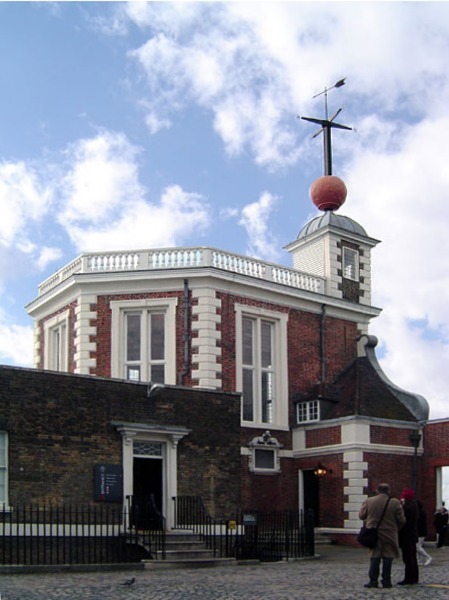
Image licensed under CC BY-SA 3.0?
5th February 1818 🗓️ : Event - Charles XIV John Charles XIV John (pictured) succeeded to the thrones of Sweden and Norway as the first monarch of the House of Bernadotte. "Charles XIV John (Swedish: Karl XIV Johan; 26 January 1763 – 8 March 1844) was King of Sweden and Norway from 1818 until his death in 1844 and the first monarch of the Bernadotte dynasty. In Norway, he is known as Charles III John (Norwegian: Karl III Johan) and before he became royalty in Sweden,..."
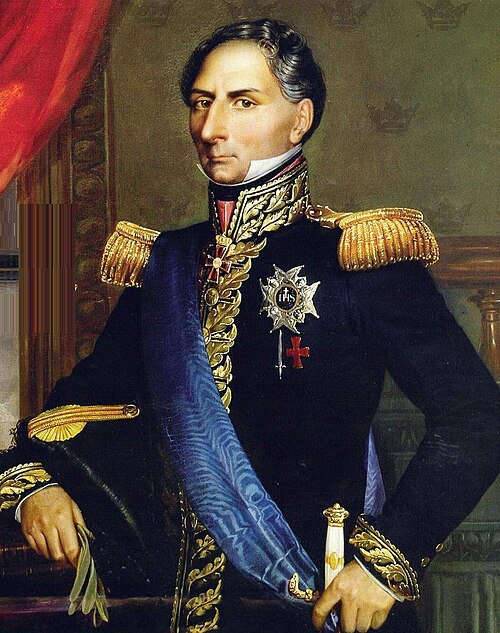
Image by
Emile Mascré
5th February 🗓️ : Holiday - Kashmir Solidarity Day (Pakistan) "Kashmir Solidarity Day (Urdu: یوم یکجہتی کشمیر) or Kashmir Day is a national holiday observed in Pakistan on 5 February annually. It is observed to show Pakistan's support and unity with the people of Indian-administered Jammu and Kashmir and Kashmiri separatists' efforts to secede from India, and..."

Image licensed under CC BY-SA 3.0? by Khalid Mahmood
0 notes
Text
Indian Army Deploys Armado Light Specialist Vehicles Near Line of Control with Pakistan
The Indian Army has deployed an unknown number of 4×4 Light Specialist Vehicles (LSVs) known as Armado in the Rajouri-Poonch sector near the Line of Control (LoC) with Pakistan. The Line of Control (LoC) is a military control line between the Indian- and Pakistani-controlled parts of the former princely state of Jammu and Kashmir which does not constitute a legally recognized international boundary, but serves as the de facto border. Apart from minor details, the line is roughly the same as the original 1949 cease-fire line. It was established as part of the Simla Agreement at the end of the Indo-Pakistani War of 1971. The Army Chief has instructed local commanders in the Rajouri-Poonch sector to launch an offensive on terrorists hiding in the area and dismantle the natural caves that have become terror hideouts. On 22 December 2023 the Army suffered four casualties in a militant attack on two army vehicles, raising a question about the safety standards of troop carrier vehicles in service with the Army.
The Indian Army has deployed an unknown number of 4×4 Light Specialist Vehicles (LSVs) known as Armado in the Rajouri-Poonch sector near the Line of Control (LoC) with Pakistan. The Line of Control (LoC) is a military control line between the Indian- and Pakistani-controlled parts of the former princely state of Jammu and Kashmir which does not constitute a legally recognized international…

View On WordPress
0 notes
Text
OF INDIA AND PAKISTAN'S 'REAL YET UNREAL' WARS!
Did You Know-
India's fought ONLY ONE REAL WAR with Pak!? That's the 1999 war, u/Vajpayee!
All other 3-1946, 1965, & 1971, were 'The Greatest of Great' wars, beyond all real considerations in history today!
Samjhe!
Samjho, Apne Shastri ji isi ka khulasa karne wale the, jo maare gaye!
We've already discussed the 1st 1947 Ind-Pak war in great detail. (Link below)
Regarding the 2nd 1965 & 3rd 1971 wars, they were peculiarly fought, when Pakistan was under it's 1st set of military dictatorships/takeovers, & under the Army Chief turned President/Martial Law rules, of first Gen Ayub Khan from 1958-1969, followed by the 2nd Amy Chief Gen Yahya Khan from 1969-1971, both of whom, you'd be interested to know, who were in the actual World Governing Council controlling all the Gods & Super-Gods of the universe, for nearly to more than 40 yrs each, both beginning their GC stint in mid-1940s before our collective Independence, & continuing in it till their deaths in mid 70s, & early 80's resp! & With avg 350,000 Governing Council members in each's 'greatest esteemed' lineage!!!!
Now as for the Indian side, we all know the 2nd war was fought under the stewardship of India's most beloved PM & only human PM ever imho, Lal Bahadur Shastri! And twas after winning this war, that when Shastri found out of the real 'depth' in the matter, & root cause of problem, at Tashkent, that decided to, while 'going along with' the UN-led demand for giving back Pak occupied territory during the war, go back home from Tashkent, & make a full disclosure in front of the nation, to absolve himself of the 'sin' as the nation'd been terming, of not punishing the Pakistanis for this gross violation! (Almost exactly like Netanyahu of Israel today, but with an additional handicap of having no base for his tribe amongst world bosses). .. THAT is what he was talking to his wife on the phone about, just few mins before his most mysterious death. Remember his last words to his wife, "Main vapas aake kuch aisi baaten bataunga, ki sab ke hosh ud jayenge!" !?
Vo hosh, jo tab khulne the, khulte khulte aaj jaake khula hain, 57 yrs baad!
57 yrs baad!
Now as for the 3rdd war, we know twas Indira Gandhi who was head of Govt, & you'd be interested to know, who'd also long been in the World Governing Council governing all Gods & Super God of the world, (alongside father Jawaharlal), both since 1942 infact, & that continued in it for exactly 42 yrs, till death in 1984, a death brought on her for killing & not 'jailing' fellow Governing Council member Bhindranwale, as she was 'required' to do!
(P.S. PM Nehru's 1962 war with Mao Zedong of China, (who captured Indian territory notionally & then immediately gave it up, if you remember), infact being Mao's way of thumbing his nose at all the 'GC entitled' of this world, & nothing more at all!)
So you see, twas impossible, that both these legends & veterans of the World Governing Council, could've 'actually' fought or made their nations to fight each other, against all rules of 'The Great Game'!
But no such thing in 1999. Infact very 'mildly godlike' scenarios for 1999 on the whole! Hence real, even if startlingly similar in overall result. Both Heads of nations, involved in that war, too suffering sad & unbecoming ends, for not 'going the whole hog'.
And with India's next gen 'Elite Great Unit neo-leadership' into official power by mid- 2010's, a Pak estt that's been OWNED BY INDIA! Wherever the free chips may fall, we shall follow..


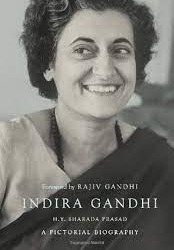


1 note
·
View note